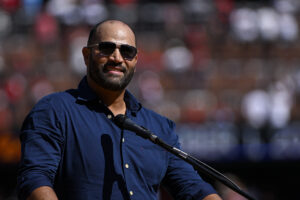NLDS Was a Nationals Exorcism
It is safe to say that Game Five of the National League Division Series between the Los Angeles Dodgers and Washington Nationals did not go the way most people expected. This Nationals team was lucky to get by the Brewers, critics said. They were lucky to even be in Game Five in the first place, critics said. Down 3-1 going into the eighth against arguably the best left-handed-pitcher since Randy Johnson, it looked like this would be another typical Expos/Nationals postseason. Then something strange happened – they came back. What happened here was another step in the Nationals Exorcism, something several star-crossed franchises seem to need if they are ever going to “finally win the Big One.”
Early Examples of a Postseason Exorcism
The postseason exorcism does not always happen, but one of the first occurrences came in 1935. That year, the Detroit Tigers won their second straight American League pennant and fifth overall. Their prior trips to the World Series did not go well. They played in, and lost, three straight between 1907 and 1909, losing the first two to the Chicago Cubs and the last to the Pittsburgh Pirates. In 1934, they lost in seven games to the St. Louis Cardinals. When the Tigers returned in 1935, they faced the Cubs again. This time, the Tigers won, four games to two, to exorcise the Cubs demons and win their first World Series title. As an epilogue, they beat the Cubs in the World Series again in 1945 – the year the Cubs won their last pennant of the 20th century.
An even bigger exorcism came in 1955. That season, the Brooklyn Dodgers won their eighth pennant of the World Series era. They had lost each of the seven World Series they had played in up to that point. The first came at the hands of the Boston Red Sox in 1916, and the second came to the Cleveland Indians in 1920. For the other five – 1941, 1947, 1949, 1952, and 1953 – they lost to the New York Yankees. In 1955, the Dodgers played the Yankees again. It felt fitting – if they were going to beat anyone to get over the hump, it had to be the Yankees. In seven games, that is what happened. To make it sweeter for the Dodgers, Game Seven took place in Yankee Stadium, where Johnny Podres pitched a 2-0 shutout.
Boston Red Sox
Two of the most star-crossed franchises in baseball history – the Boston Red Sox and Chicago Cubs – snapped decades-long droughts by slaying dragons that had tormented them during their losing streaks.
The Red Sox, after defeating the Cubs in the 1918 World Series, did not return to the World Series for 28 years. When they got there, they lost the 1946 World Series in seven games to the Cardinals. They returned to the World Series with the Impossible Dream of 1967 and lost again to the Cardinals in seven games. They missed winning the AL East in 1972 by a half-game when the Tigers played (and won) one more game due to a player’s strike. (When the strike ended, all sides agreed that no missed games from the strike would be made up, so the Red Sox were left holding the bag.) In 1975, they lost the World Series to the Cincinnati Reds, once again in seven games.
They blew a mid-August nine-game division lead in 1978, falling three and a half games behind the Yankees in mid-September. They then ended the season on an 11-2 tear to catch the Yankees and force a tiebreaker game at Fenway Park, only to lose thanks to a home run by Bucky Dent, whose middle name in New England is an expletive. The Red Sox returned to the World Series in 1986 after coming back from a 3-1 deficit – and being one strike away from elimination – in the ALCS against the California Angels. They lost that World Series in seven games to the New York Mets, with Game Six ending on the late Bill Buckner’s infamous fielding error.
Pennant Denials
In 1988 and 1990, they returned to the ALCS but lost both times in a sweep at the hands of the Oakland Athletics, whom they swept in the 1975 ALCS. The Red Sox returned to the postseason in 1995 but lost the ALDS to the Indians in another sweep. They got revenge on the Indians in the 1999 ALDS but then lost the ALCS that season to the Yankees in a sweep.
In 2003, they came back from an 0-2 deficit in the Division Series to defeat the Athletics, earning another matchup with the Yankees in the ALCS. They were five outs away from the pennant in Game Seven, but the Yankees rallied back from a 5-2 deficit in the bottom of the eighth to tie the game. This one ended with Aaron Boone’s 12th-inning walk-off home run off Tim Wakefield.
Red Sox Exorcism
2004 saw the Red Sox sweep the Anaheim Angels in the ALDS, with David Ortiz ending the series with a 10th-inning home run over the Green Monster. A Yankees sweep of the Minnesota Twins – who have their own demons to conquer now – made for Round Three of Red Sox-Yankees in the 2004 ALCS. After dropping two close ones in New York, the Red Sox found themselves on the business end of a 19-8 shellacking in Game Three. Game Four felt academic, especially as the Yankees carried a 4-3 lead into the top of the ninth with Mariano Rivera on the mound.
Only something changed. Kevin Millar led off with a walk. Current Dodgers manager Dave Roberts then ran for Millar. After what seemed like 20 kajillion pickoff attempts to first, Roberts stole second on the first pitch to Bill Mueller, who ultimately singled him home and tied the score. The Yankees left the bases loaded in the 11th and a runner stranded on second in the 12th. In the bottom of the 12th, Manny Ramirez led off with a single and scored when Ortiz followed with a walk-off home run to the tunnel in right field.
Then the Red Sox won Game Five, coming back again to tie the game against Rivera in the bottom of the eighth this time. They ultimately won in the 14th on a walk-off single by Ortiz, scoring Johnny Damon from second. Then they won Game Six – a game that deserves its own article – 4-2 before winning a 10-3 blowout in Game Seven. Pokey Reese, who fielded the last out, wore #3, just like Babe Ruth, subject of the famous “curse” they had just snapped. In the World Series, they swept their National League Nemesis, the Cardinals, shedding 86 years of baggage.
Chicago Cubs
After the Cubs lost the 1945 World Series to the Tigers, they did not return to the postseason at all for 39 years. When they did – in the best-of-five 1984 NLCS – they faced the San Diego Padres. After winning the first two games in Chicago, they dropped the next three games on the road. Game Three was a 7-1 blowout, but the other two losses were excruciating. Steve Garvey went 4-for-5 in Game Four, driving in five runs and hitting a walk-off two-run homer in the bottom of the ninth off Lee Smith for a 7-5 victory. Game Five saw the Cubs blow a 3-0 lead and lose, 6-3. First baseman Leon Durham had a routine grounder go right through his legs, opening the floodgates for a four-run seventh that allowed the Padres to take the lead.
They next visited the postseason in the 1989 NLCS, where the Giants defeated them in five games. The Cubs’ only win came in Game Two in Chicago. They next made the postseason in 1998, but the Atlanta Braves swept them in the Division Series. The Cubs looked like they had turned it around in 2003, when they beat the Braves in five games in the Division Series, with Game Five in Atlanta.
In the 2003 NLCS, they had the Florida Marlins on the ropes, leading 3-0 in the top of the eighth in Game Six at Wrigley Field and needing only five outs to win their first pennant since 1945. Then the infamous foul ball happened, and the Marlins suddenly started hitting. After what seemed like only two and a half minutes, the Marlins led, 8-3, and they held that score for the rest of the game. The Cubs then dropped Game Seven, 9-6.
More Demons, Then the Turnaround
The Cubs next made the postseason in 2007 and again in 2008, where the Arizona Diamondbacks and the Dodgers swept them, respectively, in the Division Series. 2015 saw them win the Wild Card Game over the Pirates and beat the rival Cardinals, 3-1, in the Division Series only to be swept by the Mets in the NLCS.
They faced the Giants, who beat them in 1989, in the 2016 Division Series. They won the first two games in Chicago but lost Game Three in San Francisco. (Sound familiar?) In Game Four, the Cubs closed out the series by winning, 6-5. They then beat the Dodgers, four games to two, to win their first pennant since 1945. The World Series at that point was gravy, but they ended up coming back from a three-games-to-one deficit to defeat the Cleveland Indians (another star-crossed franchise) in seven, winning their first World Series since their back-to-back run in 1907 and 1908.
Their 2016 run exorcised three demons. First, they knocked out the Giants, the team who beat them in 1989. Next, they ousted the Dodgers, who had swept them in 2008. Finally, they shook the California Curse. Until Game Four in San Francisco, the Cubs had yet to win a playoff game in the State of California. In 2016, they won three out of the five games they played in the Golden State.
Montreal Expos/Washington Nationals
The Expos (1969-2004, now the Nationals) only made the postseason once, in 1981. That year was split into two by a two-month-long strike. During the strike, the owners decided to split the season into two halves due to how goofy the strike made things. As a result, the teams in first place when the strike began were all declared “First Half Champions,” and the records reset for the “Second Half” when play resumed after the strike.
The Expos ended up winning the second half by a half-game over the Cardinals and facing the defending champion Philadelphia Phillies in the Division Series. In a thrilling see-saw series, the Expos won the first two games at home and then lost the next two in Philadelphia – one thanks to a walk-off solo home run in the 10th inning by George Vukovich. The Expos then won Game Five on the road to advance to the NLCS against the Dodgers.
That series was one of the best ever played. The teams split Games One and Two in Los Angeles and then split Games Three and Four in Montreal. Game Five, postponed by a day because of rain/slush/snow, ended up being played on a cold Monday afternoon, October 19th. It entered the ninth inning as a 1-1 tie due to fabulous pitching by Fernando Valenzuela and Ray Burris. In the top of the ninth with two out, Rick Monday belted a towering home run to right center, giving the Dodgers a 2-1 lead. With the tying and winning runs on base in the bottom of the ninth, Bob Welch got Jerry White to hit a series-ending groundout to second.
Washington Nationals Postseason Heartbreaks
“Heartbreaks” is probably the wrong word – “sucker punches to the gut” would be more accurate. They first made the postseason in 2012, facing the wild-card Cardinals in the Division Series. In the last year of the 2-3 Division Series format, where the team with home field advantage plays Games Three through Five at home, the teams split the first two games in St. Louis. The Cardinals then won Game Three.
Game Four was a nail-biter. The teams entered the bottom of the ninth of Game Four tied at one. Jayson Werth led off and, on the 13th pitch of his at-bat, sent a drive into the left field bullpen for a walk-off solo home run to force a fifth game.
One Strike Away – Twice
Game Five is one of the most excruciating losses – or exhilarating comebacks, depending on the point of view – in playoff baseball history. The Nationals jumped out to a 6-0 lead in the bottom of the third, then saw it slowly dwindle. An RBI double by Matt Holliday in the top of the fourth made it 6-1. Then a bases loaded wild pitch and a bases loaded walk by Gio Gonzalez in the top of the fifth made it 6-3. An RBI groundout by Holliday in the top of the seventh made it 6-4, then a leadoff homerun by Daniel Descalso in the top of the eighth made it 6-5. Kurt Suzuki, however, gave the Nationals an insurance run in the bottom of the eighth with an RBI single.
The top of the ninth saw Drew Storen take the mound to close out the game. Despite a leadoff double by Carlos Beltran, Storen ended up getting one strike away from closing out the series, facing Yadier Molina with a runner on third, two out, and a 2-2 count. However, Storen threw two balls in a row, walking Molina. Up came David Freese, and the count ran to 1-2. Three straight balls then walked him. Now the bases were loaded for Descalso, who hit a hot one-hopper to short. A diving Ian Desmond got his glove on it but couldn’t secure it, and the ball deflected off him into center for a two-run single that tied the game. The Cardinals tacked on two more, taking a 9-7 lead, and held on for the victory.
More Demons
In 2014, the Nationals won the National League East with the league’s best record for the second time in three years. They faced the wild-card San Francisco Giants, who beat them three games to one. All three losses – including an 18-inning marathon in Game Two – came by one run. They made the NLDS again in 2016, facing the Dodgers. The Nationals held a two-games-to-one lead going into Game Four but lost, 6-5, despite fighting back from a 5-2 deficit in the top of the seventh to tie the game. They then lost the fifth game at home, 4-3, to lose the series. Once again, all three of their losses were by one run.
The Nationals returned to the Division Series in 2017, this time facing the defending champion Cubs. Once again, the Nationals lost in five games, with two losses coming by one run this time. They even held a 4-3 lead in the fifth inning of the fifth game with Max Scherzer on the mound, but they ended up losing, 9-8.
Nationals Exorcism, Part One
That brings us to this season. In the Wild Card Game, they trailed 3-1 against the Brewers in the bottom of the eighth with elite reliever Josh Hader on the hill. The Nationals players, many of whom had suffered playoff heartbreak before, refused to give up, however. In a truly strange inning, they rallied for three runs to take a 4-3 lead. Converted starter Daniel Hudson then pitched a scoreless ninth to win the game and send them to the Division Series against Playoff Demon #1 – the Dodgers.
If the Nationals Exorcism were to start anywhere, it would have to be with the Dodgers. Blue Monday? The 2016 Division Series? Get the biggest demon out of the way first. Things didn’t look good for the Nationals after they lost a 6-0 laugher in Game One, but Game Two turned it around. Then Game Three also went terribly for the Nationals as they lost 10-4. On the ropes in Game Four, they pulled off a gutsy 6-1 victory to send the teams back to Los Angeles for a decisive Game Five.
Nationals Never Give Up
The Dodgers jumped out to an early 3-0 lead. This had to look familiar to Suzuki, Stephen Strasburg, and Ryan Zimmerman, the only three Nationals left from the 2012 team. The rest of the game went as if at least one of those three talked to the other guys on the team, because, like the Cardinals, the Nationals chipped away. A leadoff double by Anthony Rendon and RBI single by Juan Soto cut the lead to two in the sixth. Then, in the eighth – off Kershaw, no less – Rendon and Soto did it again, hitting back-to-back solo home runs to start off the inning.
A collective shriek rose up from Dodger Stadium. It was not like the collective shriek of concern that came after Suzuki was hit in the wrist and face by a hard fastball to open the seventh. This was different. It was a shriek of panic followed by a collective roar of convincing. It was like the fans were trying to convince the players – and themselves – that they would score late and win like they had done dozens of times earlier in the season.
Except it never happened. Patrick Corbin and Daniel Hudson – both former Diamondbacks who had been knocked around by the Dodgers more than their share of times over the years – gave lights-out performances in relief. In the top of the 10th, embattled Dodgers reliever Joe Kelly took the mound for his second inning of work. He faced six batters and only recorded one out. First up was Adam Eaton, who walked. Then Rendon hit a ground-rule double, advancing Eaton to third. The Dodgers wisely walked Soto intentionally, bringing up Howie Kendrick.
A Personal Exorcism and a Team Exorcism
This at-bat gave Kendrick – who had committed his third error of the series earlier in the game – a chance to redeem himself. It went as well as he could have expected. He hit a towering fly – remarkably similar to Monday’s 1981 homer – deep to center that looked to be deep enough to score Eaton from third. Then it kept going, looking like it might hit the wall, only to sail over the fence and send a hush over the largest baseball stadium on the planet.
The grand slam gave the Nationals a 7-3 lead, one that they did not relinquish. The bottom of the 10th saw former Nationals closer Sean Doolittle take the mound in a non-save situation. He mowed through the Dodgers on 12 pitches, closing out the series with a perfect inning.
Nationals Exorcism, Part Two
Now they have the chance to slay their second-biggest demon – the Cardinals. Remember that the Nationals were one strike away from beating them – twice. This cannot be set up more perfectly for the Nationals. However, this is not a guarantee that the Nationals will win. The mere fact that the Cardinals are a demon for them in the first place speaks for itself. It does not matter that the two NL teams with the best record are out – these are two good baseball teams. It should make for a memorable NLCS.
The Nationals could go the route of the Cubs and continue to slay their dragons. They could do what the NFL’s New England Patriots did when they exorcised their own demons – playoff games against the Raiders and Super Bowls in New Orleans – to win their first of six Super Bowls. They could follow the example of their NHL neighbors, the Washington Capitals, who finally beat the Pittsburgh Penguins to reach the Stanley Cup Finals two years ago and then beat former Penguins goalie Marc-Andre Fleury to win the Cup. Or, they could follow the example of the NBA’s Phoenix Suns, who, in 2010, finally beat one of their playoff nemeses – the San Antonio Spurs – only to lose to their other, bigger nemesis – the hated Los Angeles Lakers – in the Conference Finals.
Regardless, this exorcism had to feel good for the Nationals and their fans. Although a loss to the Cardinals would be excruciatingly disappointing, the victory over the Dodgers shed a lot of baggage. It has permanent residence in playoff lore – not just for the Nationals, but for all of baseball. If all goes well for the Nationals and their veteran core – fans could be in for quite a ride.
Main Photo
Embed from Getty Images






